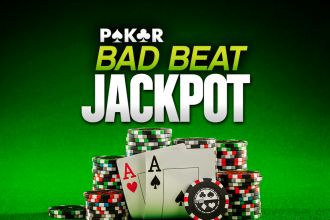Poker Bad Beat Jackpot Odds
What are the odds of having a queen high straight flush vs a royal flush with a minimum of 5 players (not sure if 5 players would come into calculations here) with both players using both pocket cards? What would the calculation (formula) look like?
Jody Stacey
As the world of online poker grows leaps and bounds, it is important to remember that bad beats exist in the land based casinos and online. In fact, to help with the bad feelings from bad beat draws, some casinos have created bad beat jackpots. By taking a small rake over a period of time, the casino can have a side pot for the best bad beat.
With JJ facing AA the odds of hitting a bad beat jackpot is: (2/48). (1/47). (2/46). (1/45). 10. 3 Which reduces to 120 / 4,669,920 Which further reduces to 1 / 38,916 Multiply that by the current jackpot at the site I am playing at which is roughly $200,000 and we get $5.14 which can make a difference, especially against a short stack. It’s the one possible saving grace when you have a huge hand and bump into an even bigger one, and this week has seen two stories about poker ‘Bad Beat’ jackpots in the news, the first a $120,000 clusterfuck of a tale from Las Vegas - the second providing over $1million worth of possibilities in Detroit.
Bad Beat Poker Hands

There are 52 x 51 x 50 x 49 x 48 / 120 = 2,598,960 sets of community cards.
Of these, there are 45 x 44 / 2 = 990 that contain QJT of hearts but none of AK98 of hearts. Similarly, there are 990 in diamonds, 990 in spades, and 990 in clubs, or a total of 3960 sets of community hands that have QJT suited but none of AK98 of that suit.
Since each player has an equal chance of 'winning,' I will calculate the chance of 'somebody' winning and then divide by five to get the chance of 'you' winning.
Separate the hole cards into each player's 'first' and 'second' hole cards.
With 5 players, there are 47 x 46 x 45 x 44 x 43 / 120 = 1,533,939 sets of five cards.
One possible 'winning' set is A8 in the suit and three other cards that are neither K nor 9 in that suit; there are 43 x 42 x 41 / 6 = 12,341 of those. Similarly, there are 12,341 sets with A9, 12,341 with K8, and 12,341 with K9, for a total of 49,364 sets of 'first cards' that can still produce the jackpot.
At this point, there are 42 cards left in the deck; whichever of the A or K that one player has, he has to get the other, so there is 1/42 chance of that, and of the remaining 41 cards, the player with the 8 or 9 has to get the other one, so there is 1/41 chance of that.
The overall probability with five players is
990 / 2598960 x 49364 / 1533939 x 1/42 x 1/41 = about 1 in 140 million.
The probability of a particular player winning is 1/5 of that, or about 1 in 700 million.
Betonline Poker Bad Beat Jackpot
